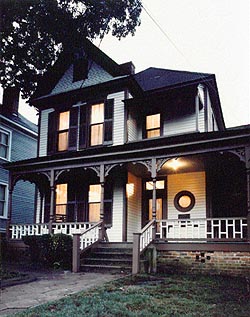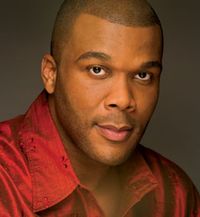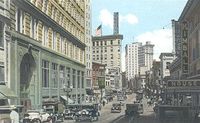
What I noticed is that there was a bigger crowd by the MLK Birth Home than at the center itself, where Dr. King and Coretta are now buried, side-by-side. And the atmosphere at the home was different as well. It was festive, alive, without the reverence found at the grave site.
There's a reason for that. With the passage of time we see, not just the tragedy of Dr. King's death, but the wonder of the life preceding it, and we're curious about it.
The home itself isn't much of a much. It dates from the time of my own home. It's a two-story wood structure very similar in design to many of the infill homes going into my own neighborhood.
So I get this idea.

Unfortunately it's a niche audience. Perry runs some TV shows on cable and, about once a year, a movie where he appears in drag as Medea. It's the kind of thing Bob Johnson did with Ebony and Jet. It serves a niche, it makes money.
But I think Perry can do more. I think he can be more like Oprah. And “Sweet Auburn” is the way forward.
It's a dramedy – that's part drama, part comedy. It takes place on Auburn Avenue, starting in the 1930s, in the home of the King Family. Daddy King is a preacher on the street, and not at the biggest church on the block by a long shot, but a small brick building down a ways from it. Still, he's a big man on a happening street, and there are high expectations for his children from everyone they know. But when he, or they, go beyond their neighborhood, they're niggers. They're called that to their face.
Oh, by the way, Tyler. You're just the right page for this part. How would you like to be known for playing a man instead of a woman? Pretty sweet, huh?
There's everything here that makes for great TV, and the scripts are there to be written, in biographies and histories and (yes) the living memories of some real people I know (but you'd best hurry before they all wind up in heaven). There's humor in family life, that's what Perry knows best. But there's drama in the life around this family, which is what will make this memorable.

As with a CBS pilot I recently saw shot in my neighborhood (a kind of “Designing Matlock” show starring Minnie Driver) you do exteriors for scene-setting, but you shoot mostly from a set. Perry's studio is just five miles from Auburn Ave.
This needs to feel like a real family. The show can illustrate what really happened in the city supposedly “too busy to hate” during the Depression and then into the 1940s. Daddy King is the star – I met him once near the end of his life and he was a formidable figure. But the kicker is that the audience knows that his kid, watching his father act with wisdom and authority, will grow up to become the most important person of his time.
Now, Tyler, you call Oprah and you take it from there. When you accept your Emmy, a shout-out to the whole city would be nice.









